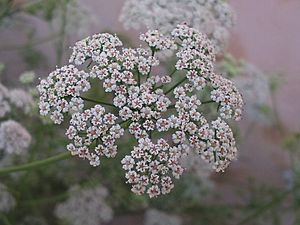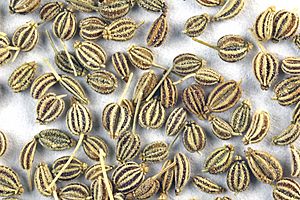Ajwain facts for kids
Quick facts for kids Ajwain |
|
|---|---|
 |
|
| Flowers of Trachyspermum ammi | |
| Scientific classification | |
| Genus: |
Trachyspermum
|
| Species: |
ammi
|
| Synonyms | |
Ajwain, ajowan, or Trachyspermum ammi—also known as ajowan caraway, thymol seeds, bishop's weed, or carom—is an annual herb in the family Apiaceae. Both the leaves and the seed‑like fruit (often mistakenly called seeds) of the plant are consumed by humans. The name "bishop's weed" also is a common name for other plants. The "seed" (i.e., the fruit) is often confused with lovage "seed".
Contents
Description
Ajwain's small, oval-shaped, seed-like fruits are pale brown schizocarps, which resemble the seeds of other plants in the family Apiaceae such as caraway, cumin and fennel. They have a bitter and pungent taste, with a flavor similar to anise and oregano. They smell almost exactly like thyme because they also contain thymol, but they are more aromatic and less subtle in taste, as well as being somewhat bitter and pungent. Even a small number of fruits tends to dominate the flavor of a dish.
Cultivation and production
The plant is mainly cultivated in Iran and India.
Culinary uses
The fruits are rarely eaten raw; they are commonly dry-roasted or fried in ghee (clarified butter). This allows the spice to develop a more subtle and complex aroma. It is widely used in the cuisine of the Indian subcontinent, often as part of a chaunk (also called a tarka), a mixture of spices – sometimes with a little chopped garlic or onion – fried in oil or clarified butter, which is used to flavor a dish at the end of cooking. It is also an important ingredient for herbal medicine practiced there. In Afghanistan, the fruits are sprinkled over bread and biscuits.
As a medication
Ajwain is used in traditional medicine practices, such as Ayurveda, in herbal blends in the belief it can treat various disorders. There is no evidence or regulatory approval that oral use of ajwain in herbal blends is effective or safe.
Essential oil
Hydrodistillation of ajwain fruits yields an essential oil consisting primarily of thymol, gamma-terpinene, p-cymene, and more than 20 trace compounds which are predominantly terpenoids.
See also
 In Spanish: Trachyspermum ammi para niños
In Spanish: Trachyspermum ammi para niños


